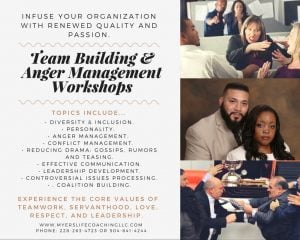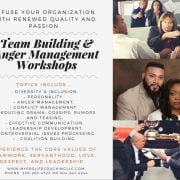Workplace Anger, Election 2016!
Don’t let politics poison the climate of your workplace, Election 2016!
In a divisive political season, tensions are high! Election 2016 is here! Workplace anger is real and the political climate of the country is fueling anger at work. It is easy to get drawn into the partisan melodrama. Have you seen your colleagues promote their candidates and demonize their opponents? This raises the question, whose values are right? Challenged Values, Spark Anger!
People who disagree with each other politically can also enjoy teamwork and common ground as they identify first and foremost as members of a culture with mission, vision and values! So before leaving work to head to the 2016 election polls, be mindful of how your attitude influences your workplace.
So what does anger in the workplace look like?
Anger can manifest as absenteeism, turnover, low morale, poor communication, reduced productivity, poor customer service, sabotage, theft, aggressiveness, sexual harassment, and intimidation (bullying). Workplace bullying is one of the fastest growing complaints of workplace violence. It constitutes offensive behavior through vindictive, cruel, malicious or humiliating attempts to undermine an individual or groups of employees through such activities as shouting, insisting that they get their way and making life difficult for those who have the potential to do the bully’s job better than the bully.
How many times have you heard…
- “Oh, Roger snapped for a second – but you know how he is.
- “She went OFF on him, but she was really stressed, you know she is going through so much at home”
- “This is like high school all over again, they just won’t stop gossiping”.
- “Everyone is getting away with murder and my manager isn’t doing a thing about it.”
Here are behaviors that may signal a need for intervention:
- Sarcastic, irritable, or moody behavior
- Apathetic and/or inconsistent work performance
- Prone to making direct or veiled threats
- Aggressive and antisocial behavior
- Overreaction to company policies or performance appraisals
- Touchy relationships with other workers
- Obsessive involvement and/or emotional attachment to the job
- Bullying
Case Study!
John Clark was a superstar in the department retail business, producing three times the monthly sales of his nearest coworker. The sales floor was filled with driven competitive sales people. His employer required a given sales per hour. This competitive policy created an atmosphere that fueled tension. He was a driven, highly competitive young man who saw his manager as getting in the way of even higher production.
Tension turned to irritability. Yelling and shouting followed. On the day he was fired, he pushed his manager in front of alarmed coworkers who reported his behavior to HR. Security was called. Charges were filed. Anger management classes were required, before ending probation would be considered.
As this case example illustrates, workplace anger is costly to the employee, the company, and coworkers. This results in wasted employee time, mistakes, stress, lower morale, hampered performance, and reduced profits and or service.Further, according to the Bureau of Justice Statistics, up to 500,000 victims of violent crime in the workplace lose an estimated 1.8 million workdays each year. Workplace anger, frustration and resentment sabotage business productivity.
John Clark was clearly under a great deal of stress, much of which was self-imposed. Stress often triggers anger responses. Learning to effective deal with stress can help prevent anger outbursts, as well as reducing employee “burnout” and hampered performance. Managers should be alert to stressed employees and recommend help, before things get out of hand. Often managers are not aware of the resources that may be available to them.
Not dealing with these types of workplace anger problem can turn into passive aggressive behavior and resentment. Control anger at work. Remaining calm, conscientious, and non-defensive, no matter who will win the 2016 presidential election, is essential to maintaining a functional and collaborative workplace culture. Companies that don’t make time for team building or relationship building inherently face talent retention and legal risks.
FACTS: ¨There are 1.7 million violent victimization—mostly assaults—that Americans experience while working each year. (This includes incidents involving customers, clients, students and other non-employees.) Legal fees average at $700,000! -(Andrews, 2005). Trust can be broken down when hostility rises. Hostility breeds resentment and that us vs. them mentality. Divisive work coalitions will prevent your employees from working together in a way that is conducive to your clients and your bottom line.
Trust in the workplace is more than just the belief that your employees, leaders, company, and brand(s) are reliable and sustainable. Trust means that the perceptions and expectations between employees, leaders, company, and brand(s) are aligned with the company’s mission in the workplace and marketplace. Trust trickles down from the top to the bottom of your organization. Trust comes from the actions that we take to ensure that healthy relationships and expectations are maintained.
While sometimes workplace anger is classified as “exploding,” other times it is born of grievances held by employees over any number of workplace anger issues. It is the little things that build up to the major incidents. Much research shows that learning to accept and let go of the wrongs done to you can release your anger and resentment. This, in turn, will improve your employees health, and help them focus on their job instead of their negative feelings.
Is “acceptance” easy? Of course not. Nor does it mean that you think that whatever happened to you was right, it does not discount the wrong or that you have to like the offending person. What it does mean is “letting go” of the negative feelings experienced when you remember a negative experience or you encounter the offending person, so that it no longer affects you. These skills will better your staff’s conflict resolutions skills.
Angry people tend to demand things, whether it’s fairness, time, respect, appreciation, agreement, or just the willingness to do things their way. We are all hurt, disappointed, and frustrated when we don’t get what we want, but don’t let disappointment turn into anger. Some people use anger as a way to avoid feeling hurt, but that doesn’t make the hurt go away. Anger is usually just on the surface. Under anger can lie embarrassment, sadness Instead, become aware of your demanding nature and change your demands into requests. Saying you would like something is healthier than saying you must have it.
Workplace Anger, Election 2016!
So what has this election taught us about workplace behavior, that diversity of opinion is a real issue that can cause organizational conflict. The latest election news has recharged the ongoing debate surrounding the predictions for the next president. So as you head to the presidential polls today, remember at the heart of dealing with anger at work, lies diversity.
Do you feel as though your organization addressing diversity? Diversity initiatives that fail to generate results, don’t work because they fail to see people as a profit center. This is a pure waste of money. Diversity initiatives that do not tie into your core leadership competences will not impact your bottom line. It’s time to place people and their diversity of thought at the center of your organization people management strategy. This is how your organization will be ready to grow and evolve into the future.

Don’t let politics poison the climate of your workplace, #Election2016!
PEOPLE INFLUENCE PROFIT! Incorporate team building and diversity training into your monthly meetings! People problems matter!
Our Workplace Anger Management Coaching Sessions are ideal for self-referrals, corporate clients, business professionals, court referred clients, couples and those interested in improving relationships with others. Our sessions, workshops, team building programs and seminars are facilitated by Dr. Jasmine Myers and are based on the Anger Management Institute Model which is a cognitive-behavioral and psycho-educationally based model approved by the National Anger Management Association. We are a life Coaching husband and wife team devoted to helping people build the skills necessary to overcome life stresses such as work conflict, jealousy, mis-trust, aggression and insecurities. Gain insight from both a minister & psychologist with over 22 years of education combined! Phone us at (228) 263-4723. Don’t let workplace Anger due to who will win the 2016 presidential election impact your bottom line!












Leave a Reply
Want to join the discussion?Feel free to contribute!